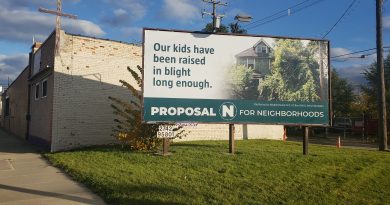Preserving The Letters: Planning Law
Happy New Year. I have a much longer post explaining where I’ve been and what I’ve been doing over the past few months. That’s coming later.
Always good at procrastinating, I finished my couple of remaining APA CEUs the last day of the year. The first class was a law class, which dealt with the highlights of the year in planning law. A billboard company that sued a municipality for restricting the construction of a billboard along an interstate highway. They won, partly– but failed to get the court to throw out the county’s entire ordinance (these people!). Elsewhere, a landlord suing the city of Seattle for prohibiting landlords from inquiring about the criminal history of applicants for rental housing. (The Federalist Society, ever saying the quiet part out loud, lamented the decision, saying that “the right to exclude is indeed central to the nation’s legal history and tradition, and therefore fundamental”).

I don’t know that they did the greatest job of explaining the cases, because the answer to every question in law basically seems like “it depends.” Planning law, in particular, is concerned principally with a few basic constitutional concepts. The First Amendment guarantees people the right to free speech (within reason); landmark cases often have involved the question of municipalities having the ability (“police power”) to regulate certain uses within their boundaries for things like billboards, signage, or other displays. The Fifth Amendment’s takings clause deals with the State’s ability to regulate the use of property– not for zoning, per se, but for any use. The simplification is that the state has
The most famous origin story for zoning begins in one such Supreme Court case, Euclid v. Ambler in 1926. The Court held that municipalities have the right to maintain and enforce zoning regulations, and Ambler unsuccessfully argued that it had been deprived of due process under the Fourteenth Amendment. (See also the Fifth Amendment).

There was even a case from Detroit. A marijuana dispensary sued the city for refusing to grant it a permit for a retail establishment. They lost because the city is granted fairly broad latitude to reasonably regulate specific land uses (both from precedents like Euclid but also from the Constitution in general). But it’s frustrating to see the city of Detroit so aggressively restrict licensing for dispensaries, because it just means that, as for grocery shopping, people go outside the city limits to buy weed. Who loses? The city of Detroit, of course. But the city of Detroit is populated by a lot of competing fiefdoms of extremely conservative people, in many cases, who don’t seem to want anything to change, even if it would be good. We’ve had similar debates in Southwest with our new board for the Hubbard Farms Neighborhood Association (I can’t create an elegant acronym for the development mantra that “No Progress Unless It’s The Progress I Explicitly Approve Of”).
Another session I did was on ethics. It wasn’t quite as interesting, but it did deal with some interesting questions about the planner’s equivalent of the Hippocratic Oath. Planners are able to submit complaints about unethical behavior of other planners. A disproportionate amount of The Discourse has previously focused on things like conflicts of interest. But I think it should focus more on planners making fundamentally unethical decisions, like the decisions to expand the numbers of lane miles. (Realistically, this is done by road engineers, who are not planners, and who abhor planners). Or the decisions to rubber-stamp stupid suburban development. I talked about this a lot at Planning Michigan. I will be talking about this at some point this year, as it’s something I think the planning profession really needs to explore.
Anyway, one of my key New Year’s resolutions is to never go for as long as I just did without writing a bunch. Or, more specifically, without posting. Like I said– more coming. And until then, stay on top of your CEUs, folks!


